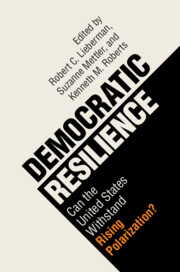Book contents
- Democratic Resilience
- Democratic Resilience
- Copyright page
- Dedication
- Contents
- Figures
- Tables
- Contributors
- Acknowledgments
- Part I Why Might Polarization Harm Democracy?
- 1 How Democracies Endure
- 2 Polarization and the Durability of Madisonian Checks and Balances
- 3 Pernicious Polarization and Democratic Resilience
- Part II Political Institutions in Polarized Times
- Part III Social Polarization and Partisanship
- Part IV Vicious Circles? The Relationship between Polarized Behavior and Institutions
- Part V Can Political Action Save Democracy in Polarized Times?
- Index
1 - How Democracies Endure
The Challenges of Polarization and Sources of Resilience
from Part I - Why Might Polarization Harm Democracy?
Published online by Cambridge University Press: 20 November 2021
- Democratic Resilience
- Democratic Resilience
- Copyright page
- Dedication
- Contents
- Figures
- Tables
- Contributors
- Acknowledgments
- Part I Why Might Polarization Harm Democracy?
- 1 How Democracies Endure
- 2 Polarization and the Durability of Madisonian Checks and Balances
- 3 Pernicious Polarization and Democratic Resilience
- Part II Political Institutions in Polarized Times
- Part III Social Polarization and Partisanship
- Part IV Vicious Circles? The Relationship between Polarized Behavior and Institutions
- Part V Can Political Action Save Democracy in Polarized Times?
- Index
Summary
Politics in the United States has become more polarized in recent decades as both political elites and everyday citizens have been divided into rival and mutually antagonistic partisan camps. Increasingly, these rival camps question the political legitimacy and democratic commitments of the other side. Such polarization or “teamsmanship” can have a number of important political consequences: it can drive actors further apart, intensify political conflict, impede negotiation and compromise, and block the construction of bipartisan legislative and policymaking coalitions. Since polarization makes it difficult, if not impossible, to find common political ground, it can prevent democratic institutions from making important policy choices and responding to the critical issues of the day. Polarization, in short, can easily lead to democratic gridlock, paralysis, the decay of rights, and, in the extreme, violent conflict, as the Trump administration’s waning weeks so vividly demonstrated.
Keywords
- Type
- Chapter
- Information
- Democratic ResilienceCan the United States Withstand Rising Polarization?, pp. 3 - 34Publisher: Cambridge University PressPrint publication year: 2021
- 1
- Cited by

